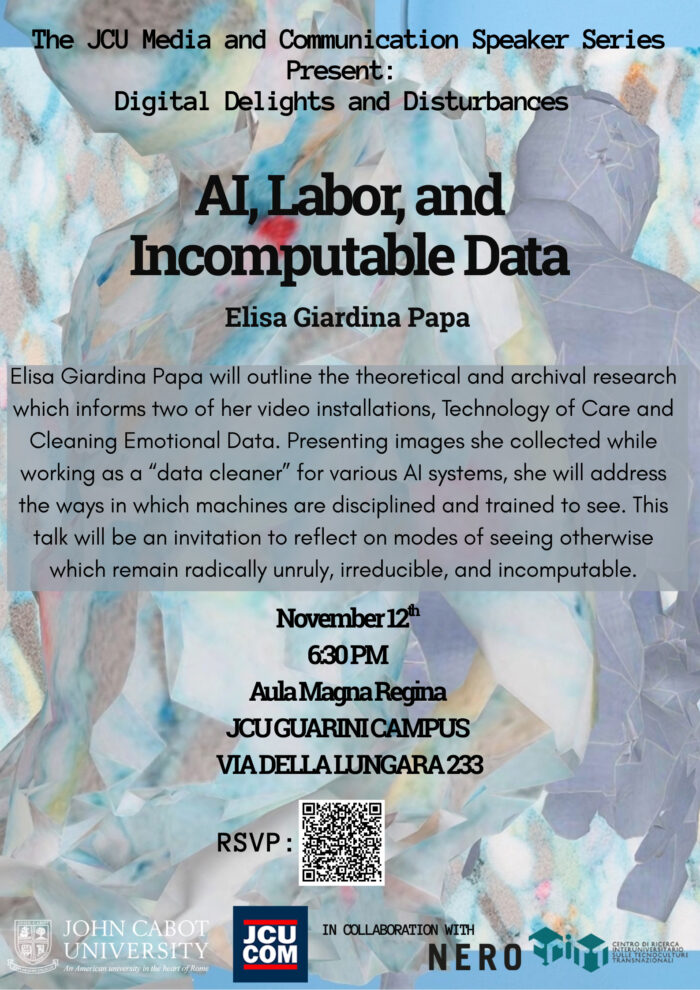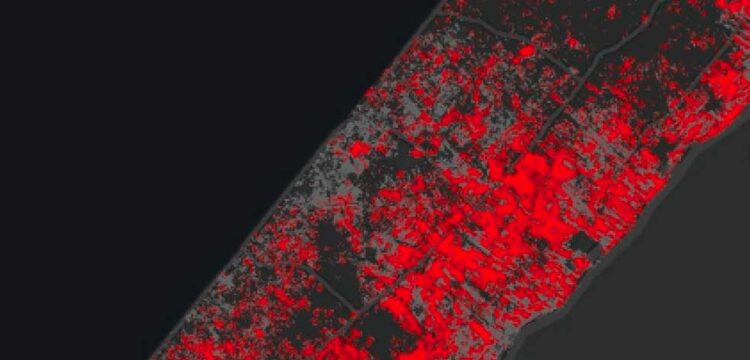AI, Labor, and Incomputable Data
How machines are disciplined and trained to see
In this talk, Elisa Giardina Papa will outline the theoretical and archival research which informs two of her video installations, Technology of Care and Cleaning Emotional Data. Presenting images she collected while working as a “data cleaner” for various AI systems, she will address the ways in which machines are disciplined and trained to see. Tracing, bounding-boxing, and labeling are key operations used to teach machines to separate Data from data, signal from noise, and orderly things from disorderly ones. They are also, Giardina Papa argues, the onto-epistemological operations of modern imperial and colonial conquest. Ultimately, this talk will be an invitation to reflect on modes of seeing otherwise which remain radically unruly, irreducible, and incomputable.
Join us for the third event of the Digital Delights and Disturbances series on Wednesday, November 12 at 6:30pm in Aula Magna Regina, Guarini Campus organized and supported by the Department of Communication and Media Studies at John Cabot University.
Digital Delights & Disturbances (DDD) offers radical ways to think out-of-the-(digital)-box we live in, imaginative and informed food for thought to feed our souls lost in the digital mayhem. DDD is organized and sponsored by the Department of Communication and Media Studies at John Cabot University, in collaboration with NERO and CRITT (Centro Culture Transnazionali).
Make sure to RSVP by noon on the day of the event at this link. More info at [email protected].
In Cleaning Emotional Data, you expose the tension between human affect and machine logic. What drew you to the notion of “cleaning” as both a technical and emotional operation?
Elisa Giardina Papa: In Cleaning Emotional Data, “cleaning” names both a technical procedure and a biopolitical demand. The project emerged directly from the period in which I worked as a data cleaner for several “human-in-the-loop” companies providing training datasets for machine-vision systems. During that time, I performed hundreds of micro-tasks designed to produce a consistent ground truth: labeling and verifying “correct” emotional expressions so that interior states could be technologically extracted from the face.
What became clear is that cleaning is not simply about preparing datasets—it is about enforcing a grammar of emotions and disciplining the face so that it conforms to predefined, supposedly universal categories. This process revealed how emotion recognition depends on an epistemological flattening: reducing complex, relational, and culturally situated forms of feeling into discrete data that can be computed.
Cleaning thus becomes an emotional operation, both because it hinges on judgments about affect and because it filters out whatever does not align—any smile that is “not happy enough,” any expression that fails to read correctly. Hence, cleaning foregrounds the violence involved in converting emotion into a data point—how the messy, disorderly, and situated dimensions of feeling are disciplined so that they can be made legible and extractable within AI’s orderly quest.
Technologies of Care visualizes a dispersed, invisible workforce of online caregivers… How did you approach representing this global network while addressing empathy, precarity, and intimacy?
Elisa Giardina Papa: Technologies of Care grew out of conversations with people working as online caregivers—ASMR artists, fetish video performers, dating coaches, fans-for-hire, and virtual assistants—who provide customized affective services through global platforms. The work highlights how these platforms fragment and anonymize labor: workers are reorganized into interchangeable packets of time that can be activated on demand.
One conversation that helped clarify this system for me was with a worker involved in the Invisible Boyfriend app. Although marketed as an automated companion, the service depended on a dispersed group of microworkers—mostly women—who collectively sustained the illusion of a single attentive partner. Their emotional labor remained hidden, allowing care to appear as an automated service while concealing the people who enabled it.
This dynamic points to what scholars Kalindi Vora and Neda Atanasoski describe as technological surrogacy: a recursive arrangement in which human workers perform emotional labor on behalf of so-called “intelligent” machines, while those machines are imagined as surrogates for historically devalued forms of care work. Technologies of Care attends to this tension, recognizing the real affective exchanges that occur while foregrounding the economic and technical arrangements that keep this labor obscured.

You often describe your work as dealing with the “incomputable.” What remains incomputable in the context of AI systems that attempt to quantify emotion and care?
Elisa Giardina Papa: For me, the incomputable is not simply what machines cannot yet process. Following Luciana Parisi, the incomputable already exists within computation—appearing in the fissures, contingencies, and disorderly data that overwhelm systems from within. In my work, I understand the incomputable as that which is within computation but also that which has always surrounded computability: forms of life, relation, and imagination that cannot be enclosed, extracted, or converted into data—what, for example, Stefano Harney and Fred Moten describe in The Undercommons: Fugitive Planning & Black Study as “before and before enclosure.”
What remains incomputable in AI’s attempts to quantify emotion and care, then, is not only their complexity but the very worlds and ways of being that refuse extractive classification and enclosure. The incomputable names a political and poetic commitment to unlearning the imperial temporality of progress and reactivating other economies of giving and sharing from which a technical life might be rethought.
Your practice bridges critical theory and poetic form. How do you navigate the balance between rigorous research and the sensorial/aesthetic experience in your installations?
Elisa Giardina Papa: My process is grounded in extensive archival and dataset research. I sift through discarded AI training sets (Cleaning Emotional Data), censored cinema repositories (When the Towel Drops), fabricated heretical accusations (U Scantu), and factitious colonial travel accounts—the project I am working on now. I treat these materials not as stable historical sources but as sites where competing epistemologies collide: colonial fantasies, juridical violence, or the ordering logics of computation meet in friction with unruly and radical traces of life.
I am interested in what these archives exclude as much as what they preserve. The gaps, distortions, and erasures become generative—places from which to reactivate abandoned practices and imagine alternative political imaginaries. I often juxtapose formal archives with vernacular, oral, and embodied ones, allowing them to contaminate one another. This approach is indebted to queer and decolonial methodologies that read with and against the archive, attending to what has been made illegible or nonsensical under regimes of order and classification.
Ultimately, I rearrange my archival and theoretical findings into speculative, fictional, sometimes disorderly cinematic scenarios. This is where the poetic enters—as a means of pressing the limits of critical analysis, of opening spaces for forms of knowledge that exceed legibility.




